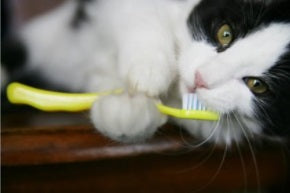
Did you know that February is National Pet Dental Health Month? The American Veterinary Medical Foundation has made February a designated time to raise awareness of periodontal health in our pets.
Cat's are much more individualistic in personality than most other domesticated animals. You know your cat's limits best! Try a few different methods and see which one your cat prefers. Being patient and gentle throughout the trial process helps create a comfortable and calm environment and will help yield better results.
Cat's have tearing teeth and no flat molars to chew their food with. While they may gnaw on treats to break off pieces or crunch their kibble, they do not chew and swallow the way we do. Their teeth are designed to tear meat from the bone to swallow without chewing.
It is recommended to brush your cat's teeth daily. That's right, daily! Best practice is to create a regimen like brushing your cat's teeth in the morning or night when you brush your own teeth. Once you have adjusted your cat to regular brushing, it only takes a few minutes a day.
What’s food got to do with it?
Kibble has to include a carbohydrate in order to bind it together, so there will always be plaque-causing ingredients included. While some kibble is designed for oral health (either through kibble shape or enzymes added to the food) there is little evidence that these do enough to provide complete dental care for your cat.
Wet food has fewer carbohydrates but can still stick to your cat's teeth.
Many raw diets include ground-up bone in their recipes which can help to scrape their teeth as they eat and swallow.
While some dental treats contain enzymes that help break down plaque and tartar, the most direct method of maintaining your cat's oral hygiene is to brush their teeth.
My cat won’t let me brush its teeth!
Cat's have big personalities and can be stubborn. Introducing the idea of brushing slowly and with a lot of praise is the best hope for achieving success.
Finger brushes are much less intimidating than a regular toothbrush and introducing them before attempting to brush can help let your cat get used to them.

Put on the finger brush during a calm time with your cat and pet them around their face. Let them sniff it and investigate and then take it off. Reward them with praise or treats to let them know that behaving calmly around the finger brush is positive.
Cat toothpaste comes in cat-friendly flavors and does not contain fluoride or harmful foaming agents found in human toothpaste.
Introduce the brushing motion to your cat slowly, and take it one tooth at a time. Slowly extend the amount of time you brush over a few weeks and let your cat get used to the feeling.
Try not to force the brushing on your cat too soon, and always stop if there are any signs of distress. Making brushing a stressful situation will make your cat unhappy, and it will become more of a chore than necessary.
Okay, my cat really won't let me brush its teeth
You tried! Cats cannot be forced to do anything, so try some healthy alternatives and be sure to schedule regular brushings at the vet.
Food Enzymes
Adding plaque and tartar fighting enzymes to your cat's meals can be a direct and helpful way to keep their mouth fresh and be sure that they are consuming the enzymes.
If your cat has an aversion to any alterations in their food try mixing up the enzymes with a little bit of water to make a paste, and smear a bit of that paste on your cat's paw. They will instinctively lick it off--whether they like it or not!
Try brands like Plaque Off, Denta Treat, Mad About Organics and Vetri-Science.
Raw Meaty Bones
Give your cat a bone! A meaty bone that is. Chicken or turkey necks can be a part of your cat's diet and provide them with a natural treat to exercise their tearing teeth.
Check out our guide to raw bones for more information on how to feed these helpful and healthy treats!
Water Enzymes
Like food enzymes, these work within your cat's drinking water to deliver plaque and tartar finding enzymes. Cats typically drink very little water on their own, making these a less desirable option for most cats.
Try Tropiclean's Fresh Breath Water Additive!
Trips to the vet

Getting a complete teeth cleaning at the vet is the best way to find any signs of oral health issues, and vets can often deep clean your cat's teeth.
Going to the vet is about more than just getting their teeth brushed. Dental radiographs are important in screening for a painful disease known as tooth resorption, a condition for which all adult cats should be evaluated.
The mouth is the entrance to the body. By making your cat's oral health a priority, you'll help their overall health.
Click here for advice from a veterinarian who specializes in dental care!
Talk to any of our POB staff for more advice on how to make your cat's dental routine even better!


